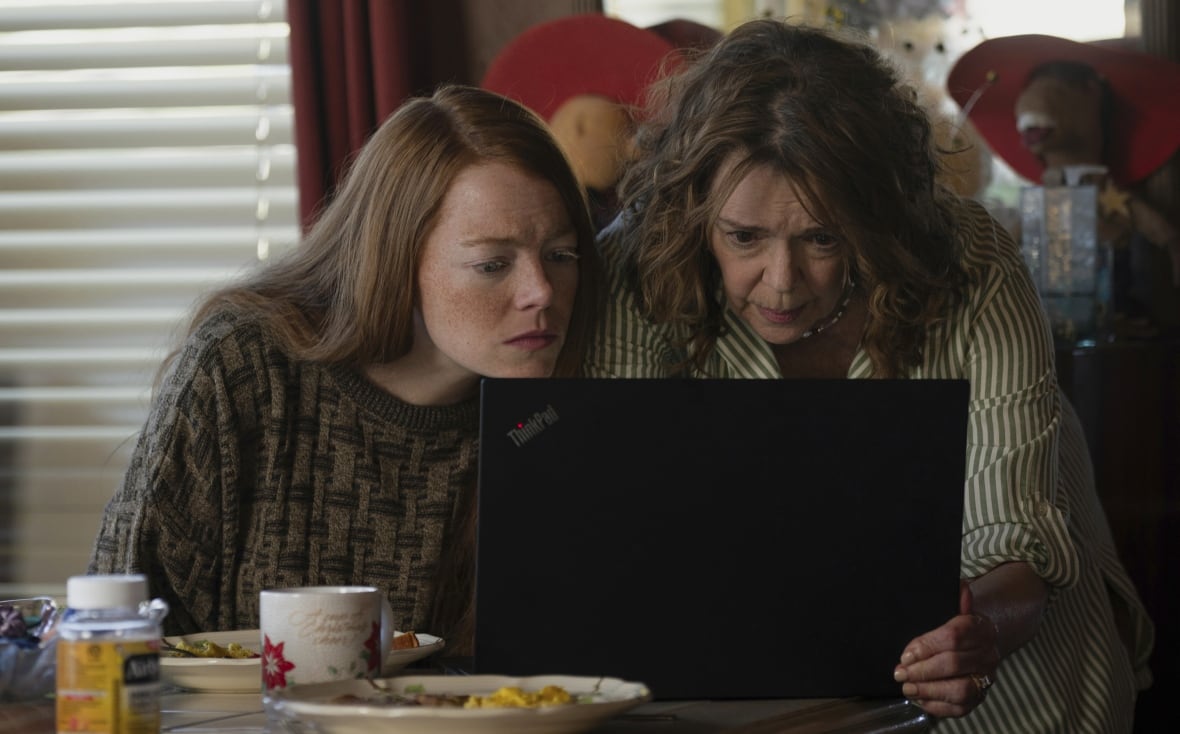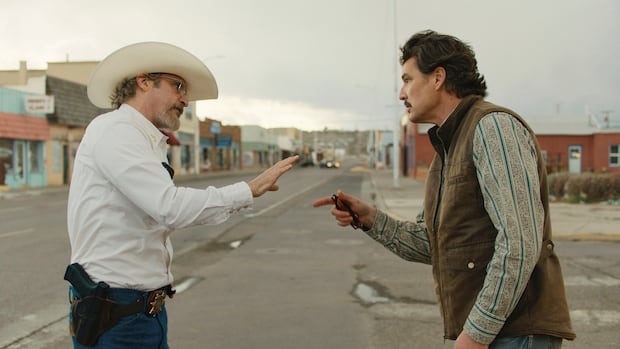Is Eddington a western? To believe writer/director Ari Aster, of course it is. Despite the fact that the Joaquin Phoenix-led feature is from the twisted mind that brought you Midsommar, Hereditary and Beau Is Afraid, Aster has not let up in interviews from dubbing it one.
And if we’re thinking geographically, it would be impossible to deny the film’s western affiliations. Placed squarely in a fictional New Mexico town, Eddington has all the sand, Stetsons and bolos you’d expect from a movie of the genre.
But zoom into the plot, and things start to fall apart.
The movie follows the story of a small-town sheriff, Joe Cross (Phoenix), at odds with a social media-savvy mayor, Ted Garcia (Pedro Pascal), over COVID-era masking mandates — with their public spat soon devolving into a mini-war.
But there’s far more: From a conspiracy-prone Etsy crafter (Emma Stone) under the spell of a QAnon-adjacent grifter (Austin Butler), or even a subplot linking ineffectually performative Black Lives Matter protests with a right-wing gun-rights vigilante, this ain’t your grandaddy’s western.

In fact, it’s about as far as you can get from Shane without superimposing Subway Surfers on the bottom half of the screen. So how do we call what feels like a TikTok Mad Libs game a western, when showing it to an actual vaquero would probably kill him faster than a Victorian child force-fed Blue Heat Takis?
“The western is a genre that’s contending with the building of America,” Aster told TheWrap. “I do feel that we are living through the collapse of something … something new is here that I think is also part of the collapse.”
And it’s true. Historically, westerns have been a kind of folkloric retelling of America’s story — one that, western author Jean-Louis Rieupeyrout explained in a 1952 essay, from its inception “patiently reconstructed, like a gigantic jigsaw puzzle, the history of the New World…. A faithful representation of a too-often unrecognized reality. It is the expression of a typically American mythology.”
So when watching anything from Custer’s more-than-slightly fictionalized last stand in Fort Apache, to the legendary Jeremiah Johnson wandering through the unsettled mountains of Utah, there is a supposed unifying throughline.
Western genre evolves
Regardless of how faithful these films are to its actual bloody founding, they seemingly operate as the truer-than-true American self-perception: a square-jawed, morally good protagonist forced to do bad things to tame great open spaces.
As story vehicle, it’s as out of proportion as how the “golden age of piracy” seeped into centuries of stories, from Pirates of the Caribbean to Robinson Crusoe. It’s as romantically inflated as Canada’s position at the end of the Underground Railroad, leading to the country playing the hero in everything from 12 Years a Slave to the imaginations of Canadians today.
Like the Wild West, these periods lasted significantly less than the span of one human life. But they prove so useful as representations of different aspects of the human experience, they’ve stuck around as genres far longer than they did as actual periods of history.
WATCH | Eddington movie trailer:
In terms of Eddington relaying the story of the country’s settling, that seems to be out the window. Cross is an established lawman for a dying 2020s town. As portrayed by Phoenix, his self-conscious preening and wanton corruption could hardly be called an idealized representation of a tough-as-nails American.
And as he posts more and more online missives about Wuhan — the Chinese city where COVID-19 was first reported — and face mask requirements, the visual cues of Eddington move further from imposing, vast landscapes to a series of claustrophobic online echo chambers.
But we have already seen the western genre evolve. There was the gradual — and still regrettably occasional — transformation of Indigenous nations from faceless opponents of “civilization” into actual people defending themselves and their way of life.
Then there was the post-war move away from sentimental action romance to noir-inspired melodramas about men both destroying and saving themselves through their own reasoning and personal choice. That doomed romantic parable of the resourceful American flexing his self-determination, even at the risk of his life, has echoes all the way from 1956’s The Searchers down to 2007’s No Country for Old Men.
Then there’s iconoclastic Eddington. Throughout, there is a spectre of a new civilization on the horizon: a foreboding new data centre coming to town. The massive building will bring jobs, Mayor Garcia says.
The project was forced through by corrupt tech oligarchs with Garcia in their pockets, the sheriff argues. And citizens worry the massive energy hog will suck up every drop of water and electricity Eddington has on reserve.
America’s future
But no matter how hard people fret, the centre is coming: It’s a kind of unstoppable tech march leaning in from the margins like a new, dread-infused Manifest Destiny. At the same time, virtually every character represents a different view for a new America: from white teens putting on sparsely attended BLM protests without a Black person in sight, to MAGA-inspired social media pundits warning of the bizarre and violent arrival of Antifa.
While any one of these could kick off a revolution, there’s a rot at the core. Worse than any of their debates or gunfights, Eddington’s citizens are doomed by their inability to understand one another — and by a lack of faith in their own ideals.
As a story, the results are kaleidoscopic: incisive but confusing; frantic but funny. But the truth remains: In Eddington, no one believes in anything — or actually wants things to get better. Instead, they pass from cause to cause, each time weighing which one will make them feel the safest, while hopefully leading to a payday.
And what, Eddington asks, could be more American than that?
